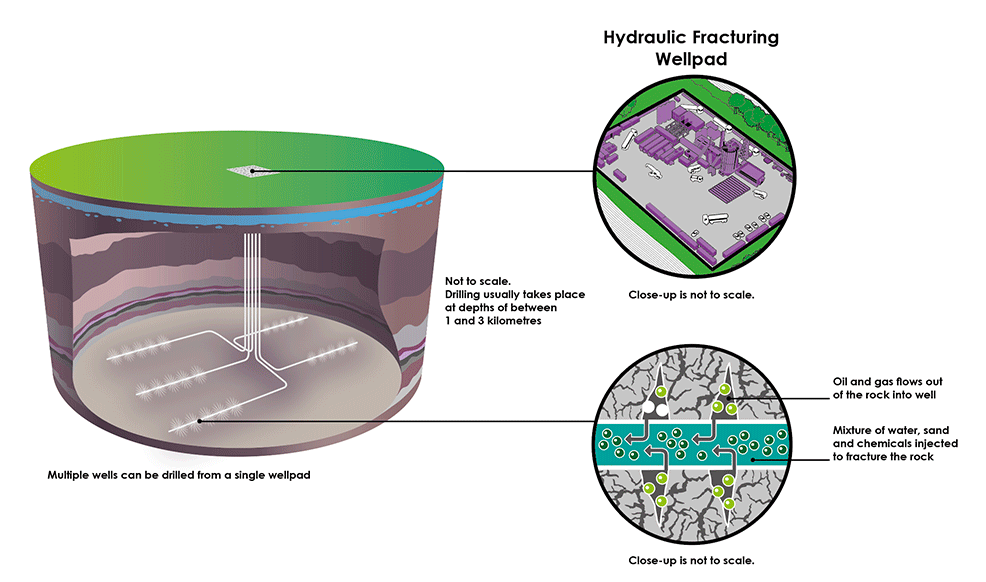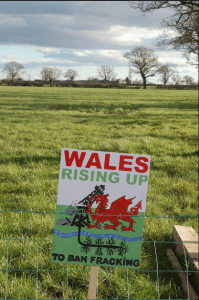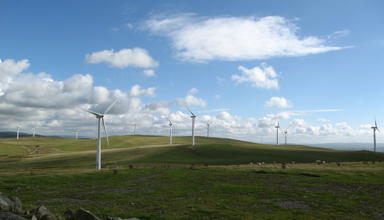On 25 October 2017 the Assembly will debate a Member’s legislative proposal from Simon Thomas AM for a bill to amend the planning system so that there is a presumption against planning permission for hydraulic fracturing (fracking). The stated purpose of the bill is to protect the landscape of Wales and public health. The bill extends from a commitment set out in the Plaid Cymru Programme for Opposition to “seek a complete ban on fracking” and the 2016 Plaid Cymru manifesto which stated:
A Plaid Cymru government will prevent hydraulic fracturing (“fracking”) and the exploitation of other forms of unconventional gas as soon as the powers are devolved through the Wales Act. In the meantime we will update planning guidance to include a new Technical Advice Note on unconventional gas.
This blog post looks briefly at what hydraulic fracturing is, current Welsh planning policy and emerging legislative competence relating to this topic. It also provides a short overview of the current situation in Scotland.
Hydraulic fracturing (fracking)
Many parts of the UK, including Wales, have resources of unconventional oil and gas reservoirs. This includes shale gas, which is natural gas trapped in fractures and pore spaces within fine-grained sedimentary shale rocks. There are two key drilling techniques used to explore for, and extract, these underground deposits; horizontal drilling and hydraulic fracturing.
The process of hydraulic fracturing sees fluid (water, sand and other substances) pumped into the well at pressure to create and increase fractures in the rock. This releases the oil and gas from the shale rocks (see Figure 1). These fractures start at the injection well and can extend a few hundred metres into the reservoir rock, typically 1-3 km below ground level.
The future of shale gas development in the UK is currently uncertain, with governments such as Scotland and Wales having moratoriums in place for exploration or extraction of unconventional oil and gas.
Figure 1: Diagram of hydraulic fracturing and drilling well 
Current Welsh Government Planning Policy
Planning policy in Wales is currently steered nationally by Planning Policy Wales (PPW, edition 9 November 2016) and a suite of guidance that includes advice notes and circular letters.
On 25 March 2016 the Welsh Government issued Town and Country Planning (Notification) (Underground Coal Gasification) (Wales) Direction 2016. This ensures that any development that may seek to explore or  extract shale oil or gas using techniques such as fracking, are not permitted in Wales. In parallel to the Notification Direction a ‘Dear Chief Planning Officers’ (CPO) letter was issued by the then Natural Resources Minister, Carl Sargeant. This put in place a process by which any applications received by local planning authorities that relate to the gasification of underground coal “must be referred to Welsh Ministers where local planning authorities are minded to approve them”.
extract shale oil or gas using techniques such as fracking, are not permitted in Wales. In parallel to the Notification Direction a ‘Dear Chief Planning Officers’ (CPO) letter was issued by the then Natural Resources Minister, Carl Sargeant. This put in place a process by which any applications received by local planning authorities that relate to the gasification of underground coal “must be referred to Welsh Ministers where local planning authorities are minded to approve them”.
This moratorium was reinforced by the Cabinet Secretary for Environment and Rural Affairs’ Energy statement on 6 December 2016, which included the following:
I will continue our precautionary approach to unconventional gas activity, including opposing fracking.
However, despite the moratorium being in place in Wales, a recent BBC article stated that some groups have argued that the Welsh Government does not have the power to stop fracking, and others have raised concerns that Ministers could be open to legal challenges.
Emerging legislative landscape for fracking in Wales
Under the Wales Act 2017, both the National Assembly for Wales and the Welsh Ministers will have powers in relation to petroleum. Importantly, “petroleum” is defined in section 1 of the Petroleum Act 1998 to include natural gas existing in its natural condition in strata (such as shale gas).
While powers around gas are generally reserved to the UK Parliament under the Wales Act 2017 (see reservation 97), there are three exceptions to reservation 97 that apply to petroleum. This means the Assembly will have powers in respect of those exceptions. For example, under the first exception, the Assembly will have powers in respect of granting and regulating licences to search and bore for and get petroleum (which, as noted above, includes natural gas existing in its natural condition in strata). The other two exceptions give the Assembly further powers in respect of petroleum, relating to things like access to land to search for petroleum and boring works that may obstruct marine navigation.
The Welsh Ministers are also given executive powers under the Wales Act 2017. Sections 23 and 25 of the Wales Act 2017 transfer powers to the Welsh Ministers in respect of onshore petroleum licensing and the right to use deep-level land in Wales for exploiting onshore petroleum.
The situation in Scotland
A recent consultation by the Scottish Government shows overwhelming public support for ban on fracking. Overall, approximately 99% of the consultation responses were opposed to fracking and less than 1% were in favour. On 3 October 2017 the Scottish Government announced that it will not support the development of unconventional oil and gas in Scotland. Scotland's Chief Planner has written to planning authorities to make clear that the 2015 Direction that gave effect to the moratorium will remain in place:
The Scottish Government will continue to use planning powers to give effect to this policy. The Town and Country Planning (Notification of Applications) (Unconventional Oil or Gas) (Scotland) (Number 2) Direction 2015, which gave effect to the moratorium on unconventional oil and gas, will continue to remain in force.
Article by, Wendy Dodds, National Assembly for Wales Research Service and Gareth Howells, National Assembly for Wales Legal Services.
Source for Figure 1: Scottish Government website
Image from Flickr by Vertigogen. Licensed under Creative Commons




